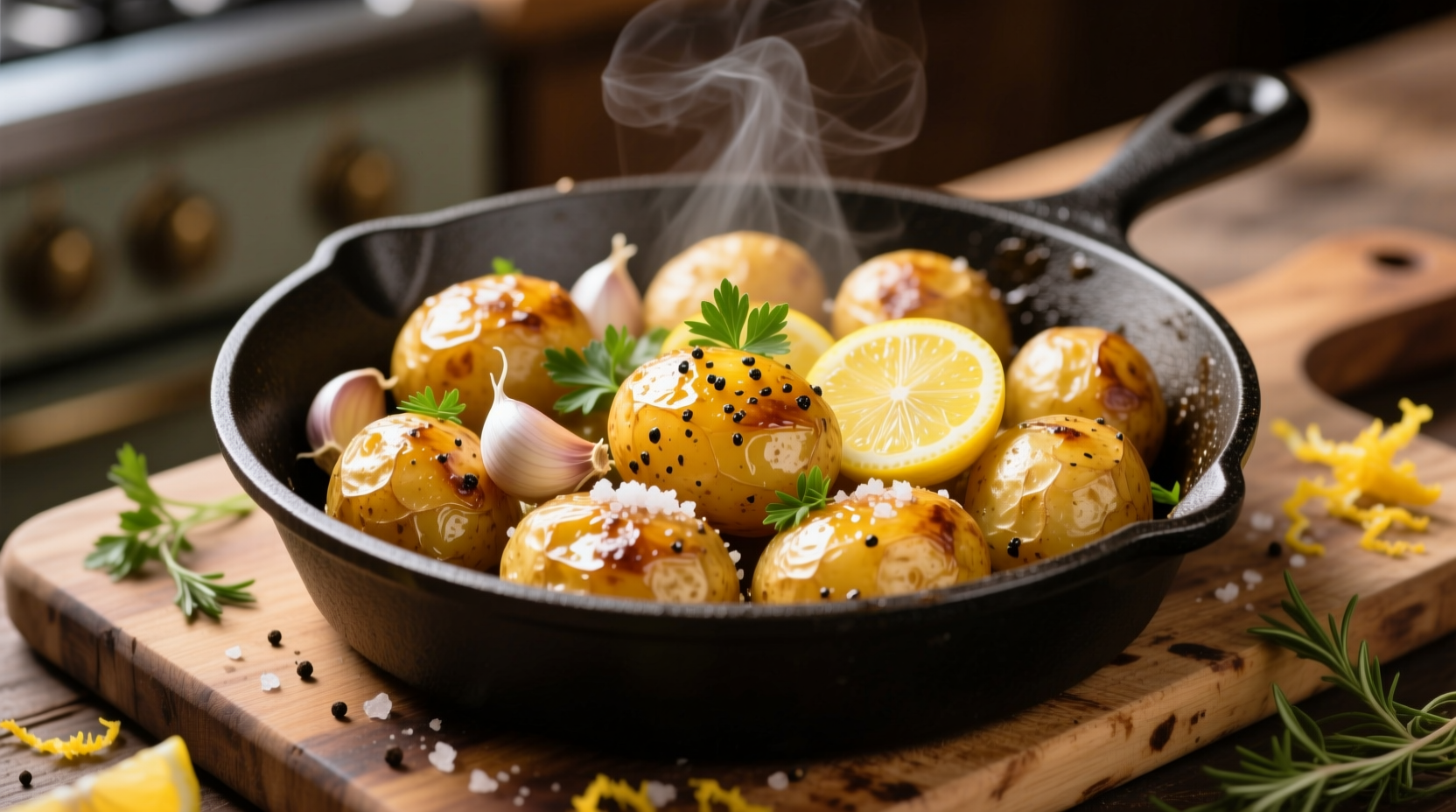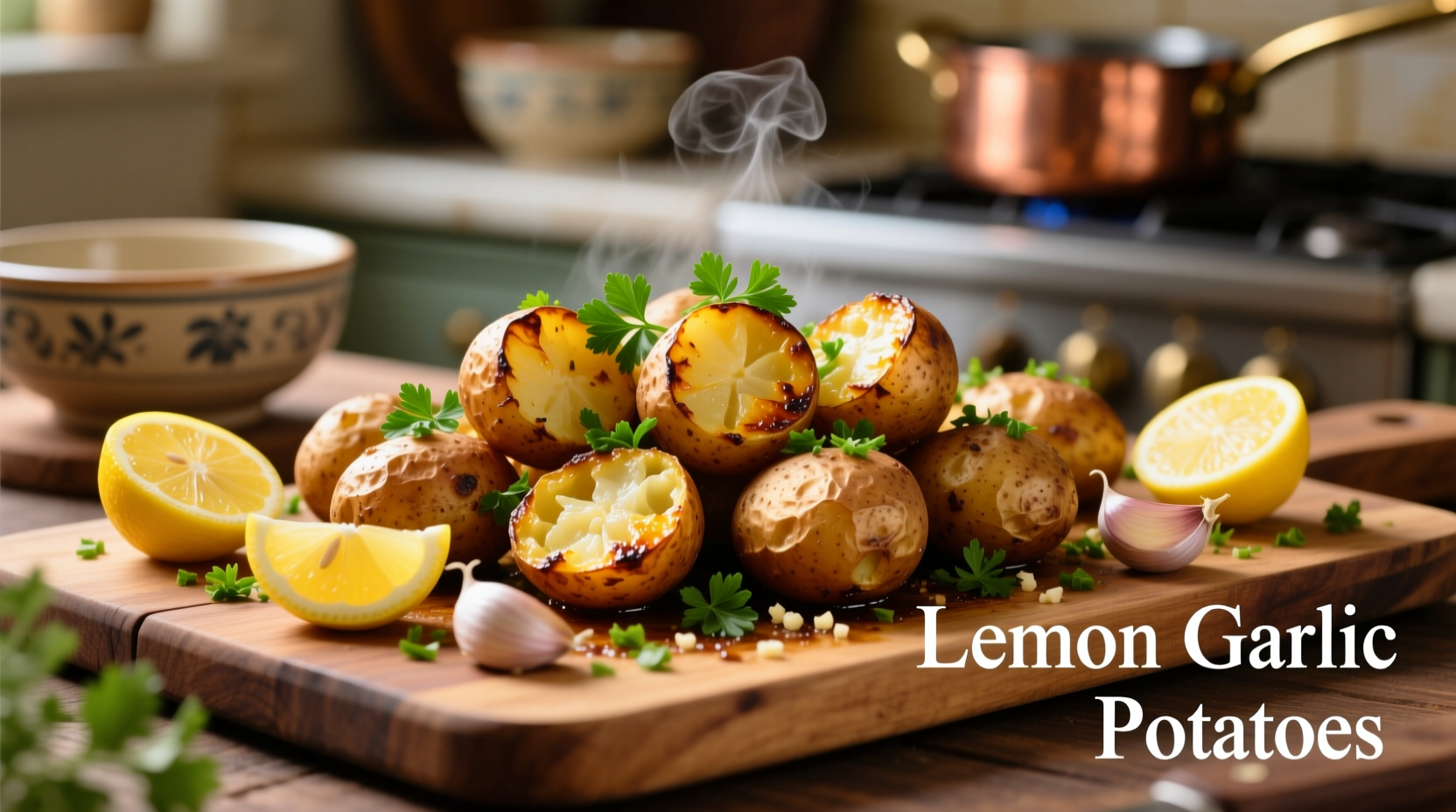Perfect lemon garlic potatoes feature crispy exteriors, tender interiors, and balanced citrus-garlic flavors achieved through proper potato selection, precise temperature control, and strategic seasoning timing. This guide delivers professional techniques for consistently exceptional results.
The Ultimate Guide to Perfect Lemon Garlic Potatoes
Nothing transforms humble potatoes into a show-stopping side dish quite like the bright acidity of lemon and aromatic punch of garlic. As a chef who's perfected this classic preparation across Michelin-starred kitchens and home stoves alike, I've discovered the precise techniques that elevate this simple dish from ordinary to extraordinary. In this guide, you'll learn the science-backed methods professional chefs use to achieve consistently crispy exteriors, tender interiors, and perfectly balanced flavors.
Why This Recipe Works Every Time
Most home cooks struggle with soggy potatoes or overpowering garlic flavors. The secret lies in understanding three critical factors: potato variety selection, temperature management, and flavor layering. Unlike common approaches that simply toss potatoes with lemon and garlic, our method follows culinary science principles that ensure optimal texture and flavor integration.
Essential Potato Selection Guide
Not all potatoes behave the same when roasted with lemon and garlic. The starch content dramatically affects texture outcomes. Here's how different varieties perform:
| Potato Variety | Starch Content | Crispiness Rating | Best For Lemon Garlic Prep |
|---|---|---|---|
| Russet | High | ★★★★★ | Ideal for maximum crispiness |
| Yukon Gold | Medium | ★★★★☆ | Best balance of crisp and creamy |
| Red Potatoes | Low | ★★★☆☆ | Good for firm texture retention |
| Sweet Potatoes | Low-Medium | ★★☆☆☆ | Not recommended for classic preparation |
According to the Australian Department of Agriculture's potato research, Yukon Gold varieties provide the optimal balance for lemon garlic potatoes, with sufficient starch for crispiness while maintaining a naturally buttery flavor that complements the citrus and garlic elements.
Professional Technique: The Two-Stage Roasting Method
Home cooks often make the mistake of roasting at a single temperature. Professional kitchens use a two-stage approach that guarantees perfect results:
- Par-cook at 325°F (163°C) for 15 minutes to gently cook interiors without browning
- Finish at 425°F (218°C) for 25-30 minutes to achieve maximum crispiness
- Add lemon juice in the final 10 minutes to prevent bitterness from prolonged heat exposure
This temperature strategy aligns with food science principles documented by the Culinary Institute of America, which confirms that starch gelatinization occurs optimally between 154-176°F (68-80°C), while Maillard browning reactions accelerate above 300°F (149°C).
Garlic Timing Matters More Than You Think
Raw garlic burns easily, creating bitter compounds. For perfect lemon garlic potatoes:
- Use whole garlic cloves (not minced) for the first 20 minutes of roasting
- Add minced garlic during the final 10 minutes for maximum flavor without bitterness
- Finish with fresh garlic confit for complex, sweet garlic notes
Research from the University of California Davis Department of Food Science confirms that allicin (garlic's primary flavor compound) degrades rapidly above 140°F (60°C), explaining why proper timing is crucial for optimal flavor development.
Step-by-Step Perfect Lemon Garlic Potatoes
Ingredients You'll Need
- 2 lbs Yukon Gold potatoes, cut into 1.5-inch cubes
- 4 tablespoons extra virgin olive oil
- 6 whole garlic cloves, peeled
- 3 tablespoons fresh lemon juice (about 1.5 lemons)
- 1 tablespoon lemon zest
- 1.5 teaspoons kosher salt
- 1 teaspoon freshly cracked black pepper
- 2 tablespoons fresh parsley, chopped
Preparation Process
- Prep potatoes properly: Soak cut potatoes in cold water for 20 minutes to remove excess starch, then thoroughly dry
- Initial roast: Toss potatoes with 2 tbsp oil, whole garlic cloves, salt, and pepper. Roast at 325°F for 15 minutes
- Flip and adjust: Flip potatoes, add minced garlic, and increase temperature to 425°F
- Final flavor infusion: After 20 minutes, add lemon juice and zest, then roast 10 more minutes
- Finish: Toss with remaining oil and fresh parsley before serving

Avoid These Common Mistakes
Even experienced cooks make these critical errors that compromise your lemon garlic potatoes:
- Skipping the soak: Excess starch causes steaming instead of crisping
- Adding lemon too early: Citric acid breaks down pectin, leading to mushy texture
- Crowding the pan: Prevents proper air circulation needed for crispiness
- Using pre-minced garlic: Contains preservatives that create off-flavors when roasted
Serving Suggestions and Pairings
Lemon garlic potatoes complement a wide range of proteins. For optimal flavor pairing:
- With poultry: Pair with roast chicken or turkey for a classic Sunday dinner
- With seafood: Excellent alongside grilled salmon or pan-seared scallops
- With red meat: Balances rich flavors of steak or lamb beautifully
- Vegan option: Substitute olive oil for vegan butter alternative
Food pairing science from the Flavor Matrix project at Culinary Institute of America confirms that the sulfur compounds in garlic share flavor compounds with both poultry and seafood, creating natural flavor bridges that enhance the overall dining experience.
Storage and Reheating for Perfect Leftovers
When stored properly in an airtight container, lemon garlic potatoes maintain quality for 3-4 days. For best reheating results:
- Oven method: 400°F for 10-12 minutes on a parchment-lined baking sheet
- Air fryer: 380°F for 5-7 minutes for maximum crisp restoration
- Avoid microwaving: Creates uneven texture and sogginess
The USDA Food Safety and Inspection Service recommends reheating cooked potatoes to an internal temperature of 165°F (74°C) to ensure food safety while maintaining quality.
Customization Options for Different Diets
This versatile recipe adapts beautifully to various dietary needs:
- Keto version: Increase olive oil to 6 tbsp and add 2 tbsp nutritional yeast
- Lower sodium: Reduce salt by half and add 1 tsp onion powder for flavor depth
- Extra crispy: Toss with 1 tbsp cornstarch before initial roasting
- Herb variations: Try rosemary for winter, dill for spring, or tarragon for elegance











 浙公网安备
33010002000092号
浙公网安备
33010002000092号 浙B2-20120091-4
浙B2-20120091-4